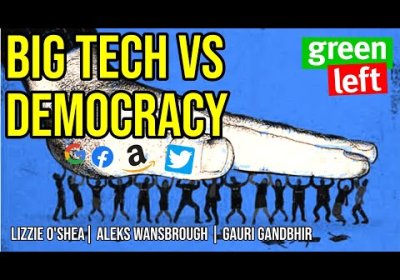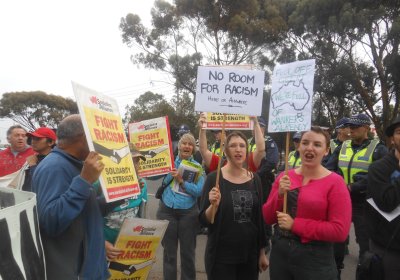For parties that supposedly stand for free speech, Coalition MPs are increasingly using defamation hearings to silence their critics. Alex Bainbridge looks at the right's culture war.
free speech
This episode of the Green Left Show features Gauri Gandbhir, Lizzie O'Shea and Aleks Wansbrough focuses on the government's proposed media code, Google's threat to abandon Australia and the debate around online free speech.
The corporate media have been full of complaints and accusations about Chinese influence in Australia. Author Clive Hamilton claims China is carrying out a “silent invasion” that is eroding “Australian sovereignty”, writes Chris Slee.
No sooner had the government won re-election when its own actions once again showed politics is, after all, fundamental to how you live, writes David Bass.
Former US intelligence analyst turned whistle-blower and activist Chelsea Manning will speak via satellite from Auckland to audiences in Melbourne and Brisbane, following the Australian government's refusal to issue her with a visa on character grounds.
While the debate on free speech has largely focused on the "rights" of racists and bigots, federal and state governments have been quietly passing new laws that strip citizens of the freedom of speech that is essential to democratic deliberation.
Sections 18C and 18D of the Racial Discrimination Act — the law against racial vilification — are under renewed attack from the right. These attacks have the backing of Rupert Murdoch's media empire and the support of the federal government, which has announced a parliamentary inquiry to determine whether this law imposes unreasonable limits on free speech and recommend whether the law should be changed.
Section 18C of the Racial Discrimination Act — Australia’s federal hate speech law — has tended to dominate public debate about free speech for the past few years. This has meant other important laws that restrict free speech in broad ways are being overlooked.
While the 18C debate has raged, important new restrictions on freedom of speech have been introduced in Australia. These have flown much further under the radar. These restrictions should concern us, because they have a wide-ranging impact on the freedom of speech that is essential to democratic deliberation.
In an attempt to avoid anti-racist protesters, the February 18 meeting to launch the Australian speaking tour of Dutch far-right politician Geert Wilders, was, at the last moment, moved to a desolate, non-residential part of Somerton on Melbourne’s northern edge. More than 200 anti-racists, however, picketed Wilders’ meeting while another 100 protested in Melbourne CBD, where one of the speakers was Greens Senator Richard Di Natale.
- Previous page
- Page 2
- Next page











